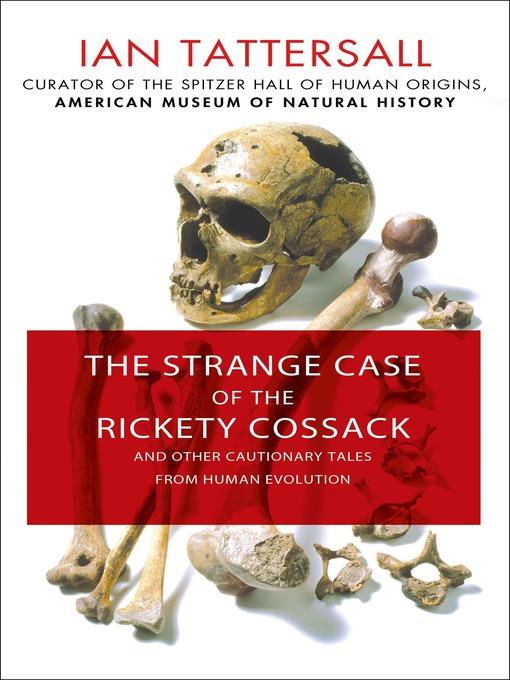
The Strange Case of the Rickety Cossack
and Other Cautionary Tales from Human Evolution
کتاب های مرتبط
- اطلاعات
- نقد و بررسی
- دیدگاه کاربران
نقد و بررسی

April 6, 2015
Paleoanthropologist Tattersall (Masters of the Planet), now retired from the American Museum of Natural History, attempts to accomplish two related goals in this relatively brief book: summarizing the history of his field and exploring the nature of epistemology within the discipline, highlighting the role he and the AMNH played in developing the field. The history he provides is abbreviated and does not add much to what has previously been written. Readers expecting a detailed survey of hominid fossils and their evolutionary relationship to one another will have to look elsewhere. Tattersall’s excursion into how paleoanthropologists work and think is far richer. He takes on a host of intellectual problems that have befuddled the field and thereby illuminates the nature of scientific progress. He explains that the Piltdown hoax taught scientists how important it is “to examine our preconceived beliefs,” and he focuses on the importance of using objective data rather than subjective impressions, even when the latter come from experts. When many of the early hypotheses of human evolution were formed, he asserts, “salesmanship was at a greater premium than
rigorous reasoning.” Throughout, Tattersall reminds readers of the pitfalls of believing in human exceptionalism, noting that “we are no exception to Nature’s rules.”

Starred review from April 1, 2015
Despite his 2012 history of Homo sapiens, Masters of the Planet, Tattersall, curator emeritus in the anthropology division of the American Museum of Natural History, revisits the subject from another angle, with equally superb results. In the earlier work, the author painted human evolution with a broad brush. Rewinding the tape, he delivers a history of the evidence itself (until recently, the majority of the evidence consisted of bones) and how paleoanthropologists interpreted it-mostly according to received wisdom, a terrible technique long discarded by other sciences. Examining early Neanderthal bones, those who believed these represented something new were drowned out by those who didn't: most famously, a leading pathologist who insisted that this was a modern man with a skeleton distorted by rickets, arthritis, and a lifetime of horseback riding-the Rickety Cossack of the title. Proceeding forward, Tattersall mixes biographies, anecdotes (many about himself), discoveries, and fierce controversies as researchers tried to shoehorn each new finding into the currently fashionable theory of human evolution. "Nineteenth century scientists preferred to see a good Darwinian progression from apelike ancestor to modern human," writes the author. Their 20th-century descendants were slow to accept that evolution in all nonhuman life is less a linear trudge to perfection than a messy bush that produces a diversity of species. Readers will share Tattersall's pleasure at the changes he witnessed on entering the profession in the 1970s, when cladistics (a biological classification system), molecular genetics, and DNA analysis delivered an avalanche of fresh information, a new view of our relation to other species, living and extinct, and plenty of controversies. An opinionated, authoritative, and delightfully provocative account of efforts to make sense of human fossil discoveries.

Starred review from May 1, 2015
When Neanderthal man was first said to be a species distinct from Homo sapiens, one German scientist countered that, on the contrary, the remains were those of a Cossack warped by chronic disease. Rooted in assumptions about the immutability of species and human exceptionality, such no-it's-not-new responses have themselves been chronic in the notoriously quarrelsome science of paleoanthropology, as Tattersall's impressively compact history of the discipline demonstrates. Exacerbating that contentiousness, field paleoanthropologists (famously, the Leakeys, parents and son) have been fiercely proprietary about their fossils. Hence, despite an explosion of fossil discoveries and the refinement of technological means to date and describe them, there is still great resistance to what Tattersall concedes is his positionthat like all other genera, hominids speciated as natural selection and environmental pressures allowed. The great debate between exceptionalists and diversifiers is the intellectual main theme of the story of exploration and discovery that Tattersall is able to relate succinctly yet in gratifying detaila story that includes the Piltdown Man hoax, the brilliant but constricting mid-twentieth-century New Evolutionary Synthesis, and Stephen Jay Gould and Niles Eldredge's conception of punctuated equilibriums. If Tattersall isn't interested in entertaining (he never jokes), he's also determined not to confuse. Though a very personal account, this is superb science history.(Reprinted with permission of Booklist, copyright 2015, American Library Association.)

























دیدگاه کاربران